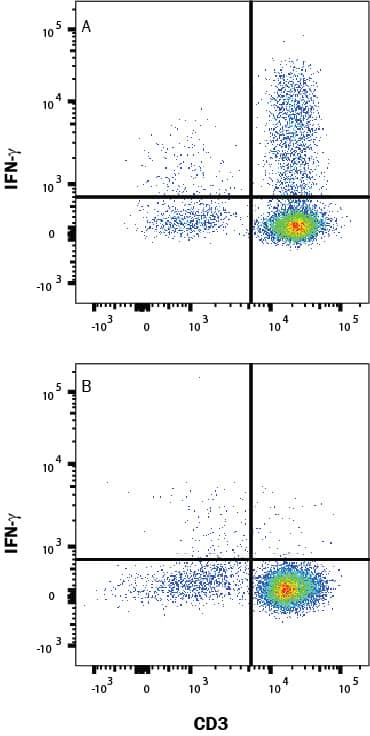Mouse IFN-gamma Alexa Fluor® 700-conjugated Antibody
R&D Systems, part of Bio-Techne | Catalog # IC485N


Key Product Details
Species Reactivity
Validated:
Cited:
Applications
Validated:
Cited:
Label
Antibody Source
Product Specifications
Immunogen
Specificity
Clonality
Host
Isotype
Scientific Data Images for Mouse IFN-gamma Alexa Fluor® 700-conjugated Antibody
Detection of IFN-gamma in Mouse Splenocytes by Flow Cytometry.
Mouse splenocytes either (A) stimulated to induce Th1 cells or (B) unstimulated were stained with Rat Anti-Mouse IFN-gamma Alexa Fluor® 700-conjugated Monoclonal Antibody (Catalog # IC485N) and Rat Anti-Mouse CD4 PE-conjugated Monoclonal Antibody (Catalog # FAB554P). Quadrant markers were set based on control antibody staining (Catalog # IC006N). To facilitate intracellular staining, cells were fixed with Flow Cytometry Fixation Buffer (Catalog # FC004) and permeabilized with Flow Cytometry Permeabilization/Wash Buffer I (Catalog # FC005). View our protocol for Staining Intracellular Molecules.Detection of IFN‑ gamma in Mouse Splenocytes by Flow Cytometry.
Mouse splenocytes either (A) stimulated for 4 hours with Cell Activation Cocktail 500x (5476) or (B) unstimulated were stained with Rat Anti-Mouse IFN-gamma Alexa Fluor® 700-conjugated Monoclonal Antibody (Catalog # IC485N) and Rat Anti-Mouse CD4 PE-conjugated Monoclonal Antibody (FAB554P). Quadrant markers were set based on control antibody staining (IC006N). To facilitate intracellular staining, cells were fixed with Flow Cytometry Fixation Buffer (FC004) and permeabilized with Flow Cytometry Permeabilization/Wash Buffer I (FC005). Staining was performed using our Staining Intracellular Molecules protocol.Applications for Mouse IFN-gamma Alexa Fluor® 700-conjugated Antibody
Intracellular Staining by Flow Cytometry
Sample: Mouse splenocytes stimulated to induce Th1 cells or for 4 hours with Cell Activation Cocktail 500x (Catalog # 5476) were fixed with Flow Cytometry Fixation Buffer (Catalog # FC004) and permeabilized with Flow Cytometry Permeabilization/Wash Buffer I (Catalog # FC005)
Formulation, Preparation, and Storage
Purification
Formulation
Shipping
Stability & Storage
- 12 months from date of receipt, 2 to 8 °C as supplied.
Background: IFN-gamma
Long Name
Alternate Names
Entrez Gene IDs
Gene Symbol
Additional IFN-gamma Products
Product Specific Notices for Mouse IFN-gamma Alexa Fluor® 700-conjugated Antibody
This product is provided under an agreement between Life Technologies Corporation and R&D Systems, Inc, and the manufacture, use, sale or import of this product is subject to one or more US patents and corresponding non-US equivalents, owned by Life Technologies Corporation and its affiliates. The purchase of this product conveys to the buyer the non-transferable right to use the purchased amount of the product and components of the product only in research conducted by the buyer (whether the buyer is an academic or for-profit entity). The sale of this product is expressly conditioned on the buyer not using the product or its components (1) in manufacturing; (2) to provide a service, information, or data to an unaffiliated third party for payment; (3) for therapeutic, diagnostic or prophylactic purposes; (4) to resell, sell, or otherwise transfer this product or its components to any third party, or for any other commercial purpose. Life Technologies Corporation will not assert a claim against the buyer of the infringement of the above patents based on the manufacture, use or sale of a commercial product developed in research by the buyer in which this product or its components was employed, provided that neither this product nor any of its components was used in the manufacture of such product. For information on purchasing a license to this product for purposes other than research, contact Life Technologies Corporation, Cell Analysis Business Unit, Business Development, 29851 Willow Creek Road, Eugene, OR 97402, Tel: (541) 465-8300. Fax: (541) 335-0354.
For research use only
